Sep 20, 2023 | News & Events
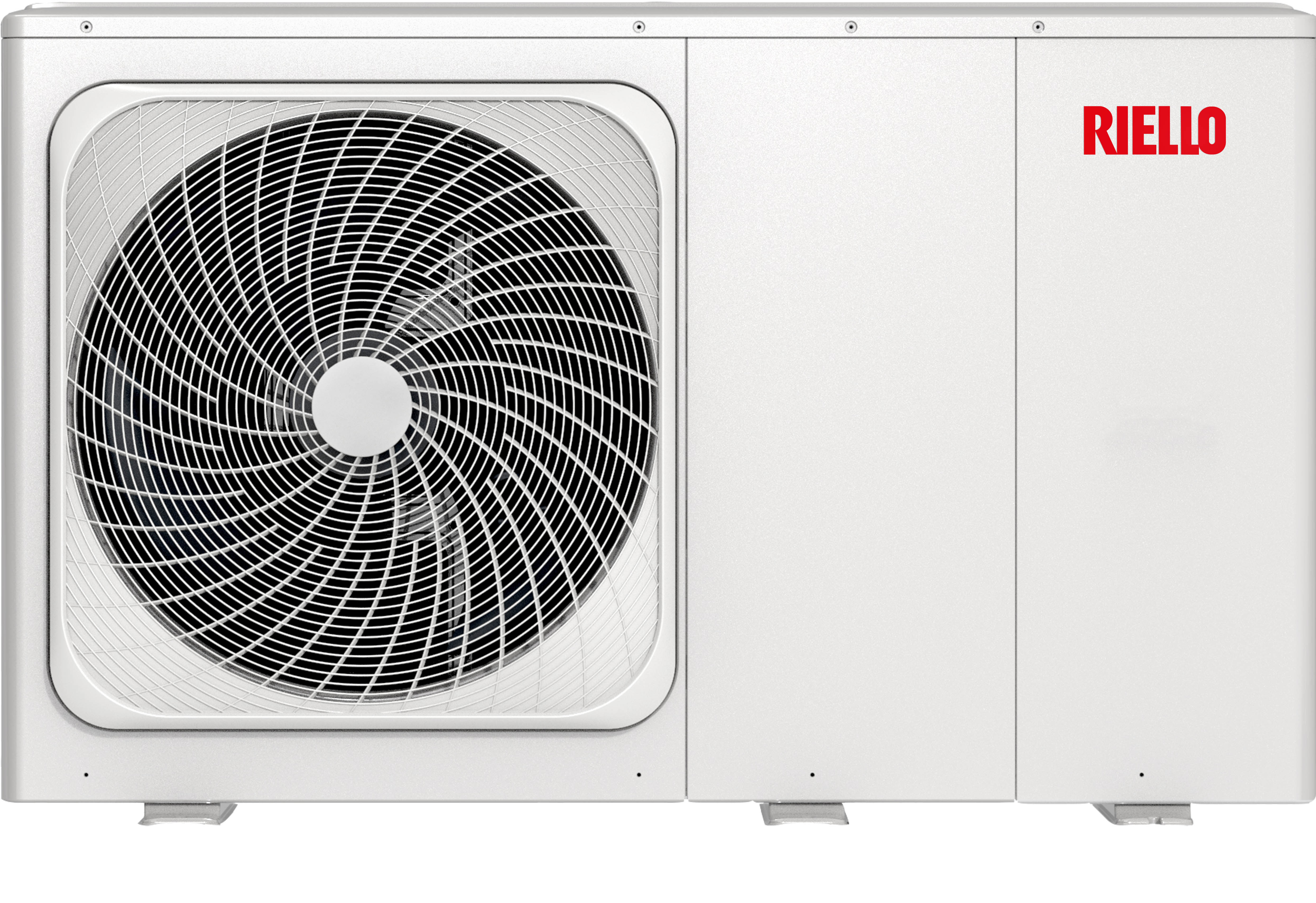 By Neil Saunders, sales & marketing director at Vokèra by Riello, Global Comfort Solutions Europe, Carrier.
By Neil Saunders, sales & marketing director at Vokèra by Riello, Global Comfort Solutions Europe, Carrier.
To support the growth of the heat pump market, the government has set out an ambitious target for the installation of circa 600,000 heat pumps per year in the UK by 2028. It’s a mammoth task, particularly as large swathes of the current workforce will need to be upskilled to ensure they are qualified to carry out the work, so should we be doing more to make training easier for busy heating engineers and support the recruitment of new people entering the sector?
In terms of the present, upskilling the current workforce to upgrade and improve heating system efficiency in homes and businesses will create rare, yet exciting, opportunities for engineers. As many customers will testify, finding a specialist to assess or repair a heating system – particularly during winter months – is often a frustrating, time-consuming process. Therefore, it’s understandable that asking a heating professional to set aside time from an incredibly heavy work schedule to receive product training could be seen as a tall order. Manufacturers should attempt to display a degree of flexibility in their training. Although there is no substitute for in-person, ‘hands-on’ training, it is not always the most practical method for those in full-time employment.
Innovative training
At Vokèra, we have created a hybrid training programme including both virtual webinar sessions and direct, ‘hands-on’ learning. This proved far more convenient for full-time installers, with the live online sessions held late afternoon and early evening. The programme will tutor installers on the latest Vokèra and Riello product innovations, as well as cover a range of topics including compliance with regulation changes, considerations when installing heat pumps, hybrid integration, etc. Workshops will also be available for those who wish to take a deeper look into our products. We believe manufacturers have a significant role in helping train the installers of the future. This is paramount to delivering the low carbon heating solutions the UK needs to create a less-polluted, more energy-efficient environment.
Second career seekers
The UK government’s support of the growing heat pump market is important to achieving its net zero ambition. Therefore, the search for skilled installers may need to include those pursuing heating engineering as a second career choice. An equal amount of focus could also be given to increase the number of women entering the trade. In both instances, the sector might be overlooking a valuable recruitment resource at a time when a greater range of expertise to call upon is essential.
Job security is another benefit of retraining as a heating engineer. Previously, we’ve partnered with colleges and training centres, providing products and guidance for students on entry-level courses. These programmes were aimed at people who had recently achieved their NVQ Level 3 qualification, required to practice as a ‘Gas Safe’ heating engineer. Whilst these courses are vital to the development of apprentices, there is a growing need to create programmes aimed at more mature trainees, creating room for future opportunities.
The type of person who might be interested in a mid-career shift to heating system installation and repair might not necessarily be an industry newcomer. Someone with an engineering background and a particular interest in decarbonisation would certainly find heating an exciting new challenge due to its huge emissions impact. Such a candidate might feel they could make a difference in heating’s carbon output, particularly with the introduction of renewables, such as heat pumps, to the market. Furthermore, IT professionals might also find interest in the heating field, as their technical background would be beneficial when using services such as connected thermostats and smart controls.
From my years in the industry, I’ve found heating engineers to be very passionate about their trade. They enjoy the challenge of creating the best heating system for their client, while also considering cost-effectiveness and optimum efficiency. In my opinion, the desire to learn a new and valuable skill that will help secure our future sustainability is requisite for the role. If you’re one of those people, I think I can speak on behalf of many heating system manufacturers in saying, ‘Your industry needs you.’
Powering up Britain
A significant transition of UK households from fossil fuel heating to smarter, environmentally-economical appliances will take years to complete. However, attitudes to the global adoption of renewable technology are changing fast. This is being fuelled in-part by high-level initiatives such as the UK government’s ‘Powering Up Britain’ proposal. Described as a way to net zero, the document outlines how renewable investment will help ‘diversify, decarbonise and domesticate’ the country’s energy production. The proposal also highlights the government’s Heat Pump Investment Accelerator plan, which aims to accelerate heat pump manufacturing in the UK. According to the report on behalf of the Secretary of State for Energy Security and Net Zero, the systems’ British-made aspect, along with an extension of the government’s three-year extension of its Boiler Upgrade Scheme, will rebalance electricity and gas costs for compatible boilers.
For those with an entrepreneurial spirit, the platform is in place to secure and build a career that’s enriching in multiple ways. Hence, there is no time like the present to upgrade your heating engineering skills or for those thinking of joining the sector, making that call that could benefit the rest of your life.
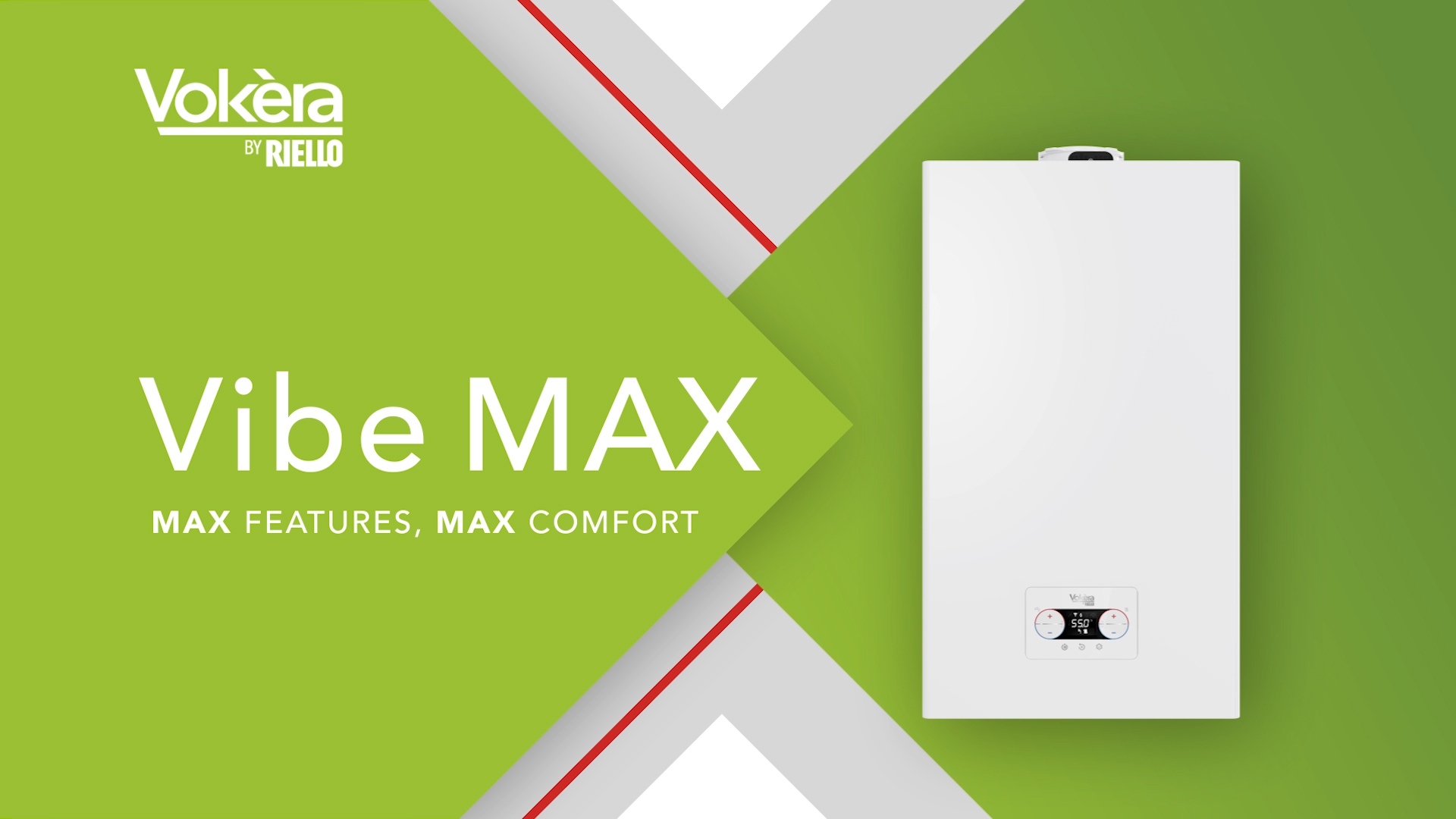
Jul 28, 2022 | News & Events
LONDON COLNEY, England, July 4th, 2022 – Vokèra by Riello has unveiled the Vibe MAX, a brand-new boiler platform that combines value-for-money with high-end functionality. Available in a choice of combi and system models, the compact Vibe MAX is designed to be 20% hydrogen-blend ready and is packed with all-new features, including built-in Modbus connector, revised ‘universal pipework’ layout, and a primary heat exchanger in corrosion-resistant stainless steel. Vokèra, through its parent company Riello, is part of Carrier Global Corporation (NYSE:CARR), the leading global provider of healthy, safe, sustainable and intelligent building and cold chain solutions.
The Vibe MAX takes the entry-level residential boiler to new heights of efficiency, functionality and reliability. The stainless-steel heat exchanger ensures optimum strength and durability, potentially increasing the life of the appliance and resulting in less downtime due to maintenance. This latest addition to Vokèra’s range also utilises advanced electronics, including a modern human-machine interface (HMI) and digital touchpad interface to assist operation, installation and servicing. Vibe MAX also incorporates a Bluetooth clock module that allows the end user to easily program the ‘heating’ ON/OFF schedule via their smart phone using our app.
The 26kW and 30kW Vibe MAX models both offer impressive 93% seasonal space heating efficiency and improved domestic hot water (DHW) performance. The compact Vibe MAX measures just 700 x 400 x 275mm, ensuring ease of handling and siting in all types of residential property, even where space is at a premium.
Hydrogen-ready boilers are considered key to facilitating the conversion of existing gas distribution networks from natural gas to low-carbon hydrogen. As a 20% hydrogen-blend ready boiler, Vibe MAX is the ideal choice for homeowners looking for an efficient heating solution that can burn a methane/hydrogen blend as and when their local network makes the switch.
Finally, as part of its advanced design Vibe MAX has the potential to become part of the IoT in today’s smart homes using Wi-Fi connectivity. This option will enable homeowners to program and control their heating for optimum comfort and efficiency and monitor their energy consumption via cloud-based services.

May 9, 2022 | News & Events
Our parent brand Riello is celebrating 100 years of innovation and engineering excellence in residential and commercial heating solutions. Riello’s expertise is now firmly focused on the future with the decarbonisation of heating.
Innovation and sustainability guide Riello in the way it operates and in the creation of cutting-edge systems. The objective is the continuous improvement of the quality of life, making the planet a better place to live today and for future generations.
This philosophy is reflected in the 100 years logo, an infinite embrace, a symbol of continuous research aimed at excellence of efficient, safe and sustainable solutions. 100 years represents an important milestone and a new beginning in the current energy transition: to be a reference player in industrial and cultural change.
For more information visit: https://www.riello.com/about-us-100-centenary

Apr 25, 2022 | News & Events
Carrier will be investing $16 million over the next two years to build an R&D Center of Excellence focused on residential and light commercial heating, air conditioning and domestic water systems located in Villasanta (MB), Italy. The goal is to expand the offering and strengthen the development of environmentally sustainable and innovative solutions, primarily heat pumps, hydrogen-ready boilers and IoT systems.
The investment will strengthen Carrier’s R&D capabilities and responds to a rapid increase in the demand for air-to-water heat pumps, efficient and sustainable solutions, as well as IoT systems and is linked to the acceleration of the roadmap outlined by the European Union’s Green Deal.
The project includes the construction of a new facility in Villasanta to house a laboratory and offices by the end of 2023.
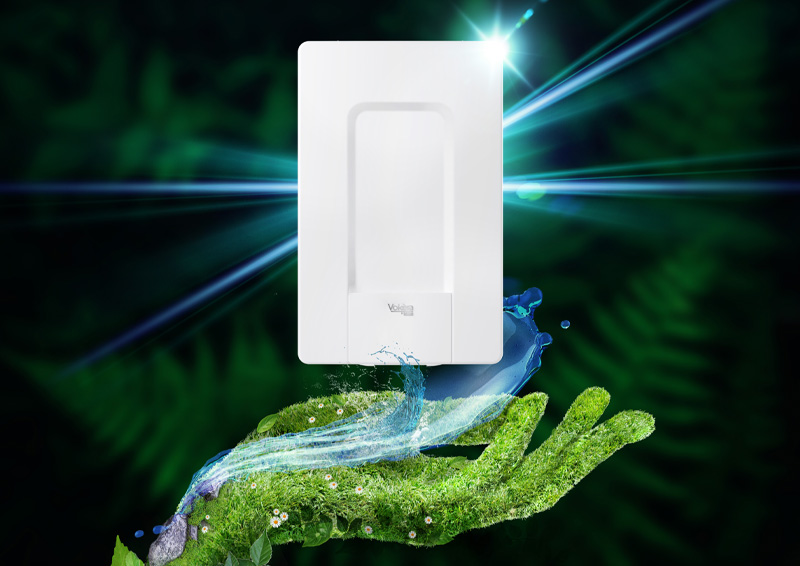
Nov 22, 2021 | News & Events
Vokèra by Riello has launched the Unica MAX, its hybrid enabled, 20% hydrogen-ready gas condensing boiler range to meet the current integration needs of various energy sources, including gas, electricity and renewables. Vokèra, through its parent company Riello Group, is a part of Carrier Global Corporation (NYSE: CARR), the leading global provider of healthy, safe, sustainable and intelligent building and cold chain solutions.
Available in a choice of combi and system models, Unica MAX also features a leading-edge heat exchanger in corrosion-resistant stainless steel. Widely recognised for its strength and durability, stainless steel used for this key component can potentially increase the life of the appliance and result in less downtime due to maintenance.
In the journey to net zero emissions, hydrogen-ready boilers are considered key to enabling the conversion of existing gas distribution networks from natural gas to low-carbon hydrogen. Designed to accept 20% hydrogen, the new Unica MAX will adapt to burn the methane-hydrogen blend when the local network makes the transition. The boilers have active combustion control (ACC) so they can adapt the air/gas mix according to the gas quality available.
At the heart of Unica MAX is a colour LCD user interface. The full text menu-driven control enables both the installer and end user to quickly navigate through the boiler’s parameters and settings, including an optional embedded time clock to program the heating on and off times as desired. The display will also provide installers with excellent diagnostics.
For homeowners looking to replace their boiler with a more energy efficient heating solution, Vokèra’s Unica MAX hybrid system ticks the right boxes. As a hybrid it combines the familiarity of a traditional boiler with the renewable energy of an air source heat pump; the system automatically switches between them depending on which will deliver the best energy efficiency at the time. Integration of a domestic hot water (DHW) tank can be carried out from solar (if any) and/or from a heat pump. The boiler carries out the possible heat integration based on the set temperature. For ambient heating, the boiler prioritises the use of the heat pump depending on outdoor temperature and the temperature required by the system.
The new Unica MAX has been conceived and developed by Vokèra to deliver warmth, efficiency and long-term reliability, with high DHW performances and up to 94% seasonal efficiency for space heating. This latest addition to the range offers a new air filter featuring filter mats that can be washed and yet still retain their technical filtering properties.
Designed for ease of installation in various domestic heating and hot water installations, the new Unica MAX range is available in two combi boiler models: 35C and 40C and a choice of 20S and 30S system boiler versions.
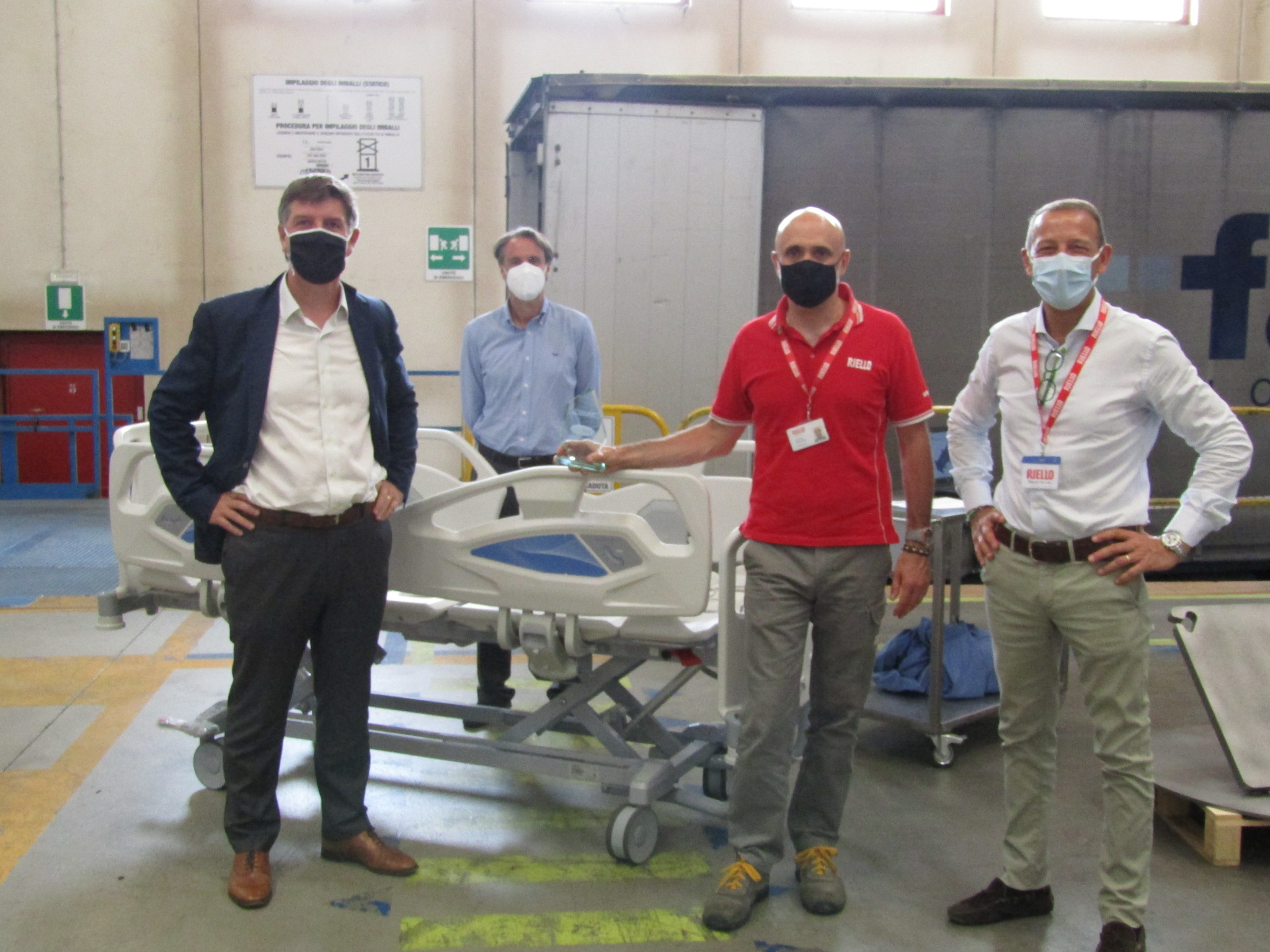
Sep 28, 2020 | News & Events
LEGNAGO, Italy, September, 2020 — Riello is pleased to announce that Pierantonio Rizzardo, Riello plant manager in Volpago del Montello, was awarded the prestigious Community Impact award from Riello’s parent company Carrier. Rizzardo was recognized for his ingenuity and speed leading an initiative to convert an entire Riello production line to an assembly line for hospital beds during the COVID-19 crisis. Riello is a leading brand in heating, air conditioning and energy efficiency products and services, and is part of Carrier Global Corporation (NYSE: CARR), a leading global provider of innovative heating, ventilation and air conditioning (HVAC), refrigeration, fire protection, security and building automation technologies.
In just 24 hours, Rizzardo and his team converted a production line typically used to assemble boilers to an assembly line for hospital beds for Favero Health Projects, a company based in the Veneto region that designs and manufactures hospital beds for intensive care. With this project, Riello has made a tangible contribution to the fight to contain the COVID-19 pandemic.
“We are very proud to have made a direct contribution in the fight against COVID-19,” said François Audo, CEO, Riello. “This is thanks to our employees and suppliers who were proactive and supported the initiative quickly and with enthusiasm. In 24 hours, Riello demonstrated its commitment to the community, bringing out its true heart, made up of professionals of value, initiative and responsibility.
“The hospital beds project was the result of collaboration with Favero Health Projects for the construction of hospital beds for the ever-increasing demand of intensive care wards at a crucial time for Italian Healthcare.”
For his leadership, Rizzardo was awarded the prestigious Carrier Community Impact award. With this award, Carrier gave a tangible sign of appreciation, rewarding him for “the exceptional contribution to health, safety and environmental protection.”
The Community Impact award was presented in July at the Riello plant in Volpago del Montello (TV) to Rizzardo in the presence of CEO François Audo, Human Resources Director Antonio Nigro and Operations Director Michele Candiani.
This initiative is in addition to the other projects Riello implemented during the emergency period, including:
– The introduction of smart-working for clerical staff in just four days, right from the beginning of the emergency;
– The adoption of all the necessary preventive measures in its plants, aimed at guaranteeing the safety and health of its operators;
– Taking out a health insurance policy for its employees in case of exposure to the coronavirus;
– The possibility, given to its network in the territory, to take advantage of free webinars on issues of interest in the sector, for the entire period of emergency.
 About Riello
About Riello
Founded in 1922, Riello Group is a leader in products and services for heating, air-conditioning and energy efficiency. Headquartered in Legnago (Verona), Italy, Riello operates in over 120 countries. Riello is a part of Carrier Global Corporation, a leading global provider of innovative HVAC, refrigeration, fire, security and building automation technologies. For more information, visit riello.com
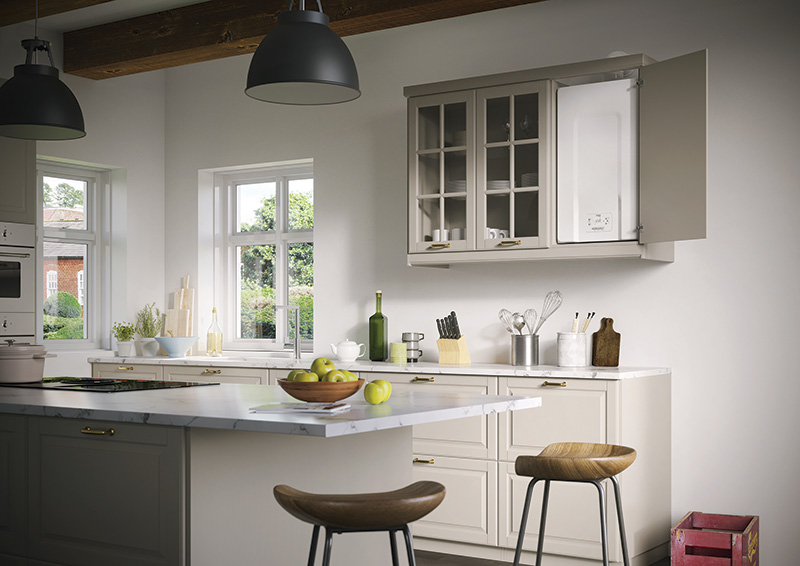
Jul 13, 2020 | News & Events
Vokèra by Riello has launched the all new Vision Plus condensing boiler range. Vision Plus adds to the features and benefits of its predecessor – including new stainless steel heat exchanger technology on selected models – to offer high flexibility in performance and installation for a wide variety of domestic applications. Vokèra, through its parent company Riello Group, is a part of Carrier, a leading global provider of innovative heating, ventilating and air conditioning (HVAC), refrigeration, fire, security and building automation technologies.
The new range includes a choice of seven boilers: four combination boilers with outputs of 25 – 40kW and three system boilers with outputs of 20 – 30kW, all with a standard seven-year warranty. Featuring a click-fit flue system for easy installation across the range, and combination models with a universal pipe connection layout, the new Vision Plus is a great choice for installers and homeowners alike.
Vision Plus combines Vokèra’s extensive knowledge of boiler design and performance in an innovative, installer-friendly range that offers Class A energy efficiency in accordance with the Energy Related Product (ErP) Directive. All models are feature-packed to deliver energy-saving comfort and long-term reliability and have the OpenTherm controls protocol embedded.
As a further innovation, the 35kW and 40kW combination boilers and all three system boilers in the Vision Plus range feature a new, optimised radial stainless steel heat exchanger, which enables a wide modulation ratio of 1:8 for optimum operating efficiency and flexibility. This means that the Vision Plus 40C combi, for example, can modulate down to 4.9kW and the 35C down to just 4.4kW. This ensures that boiler cycling is reduced even when the central heating load is minimal. Ideal for larger homes, the 40C delivers an excellent domestic hot water rate (DHW) of 16.4 litres per minute at ΔT 35 C, while the 35C has an equally impressive DHW rate of 14.2 litres per minute at ΔT 35 C.
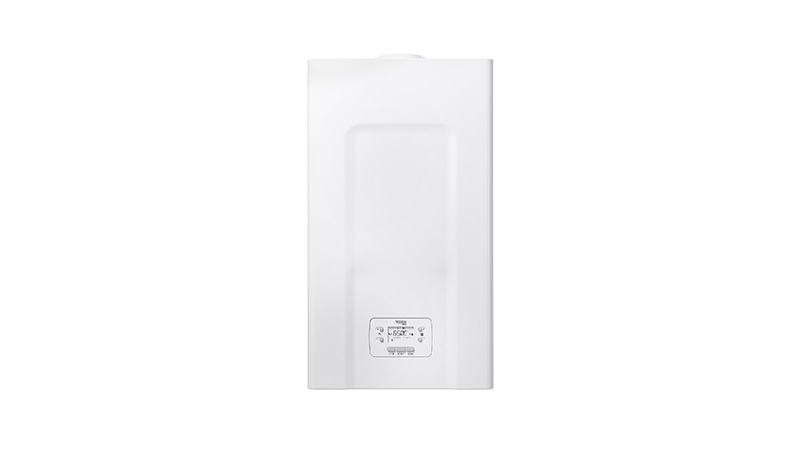
The 25C and 30C combination models use a proven aluminium heat exchanger, offering high thermal conductivity and combining the benefits of a lightweight, compact design. These models have small installation footprints and the rear flue option makes it easy to fit these compact appliances into small spaces, such as kitchen cupboards. They are also lightweight for easy handling and transportation.
All Vision Plus combination boilers have a built-in filling loop and include an embedded seven-day time clock with three modes of operation and back-lit LCD display for energy-saving comfort and control of heating times throughout the week. The universal pipe connection layout on all combination models also makes it easier when replacing another boiler with Vision Plus.
The system heat-only Vision Plus boilers can provide central heating, be matched with Vokèra AquaFlow unvented cylinders to provide domestic hot water storage, and be connected to any existing S-Plan or Y-Plan system. A wide modulation ratio ensures flexibility and efficiency and, thanks to the Modbus protocol, the entire Vision Plus range is designed to be ‘hybrid ready’ for integration into low carbon heating system designs. For further flexibility, all system models boast a built-in relay, which allows for easy integration with zone valves.
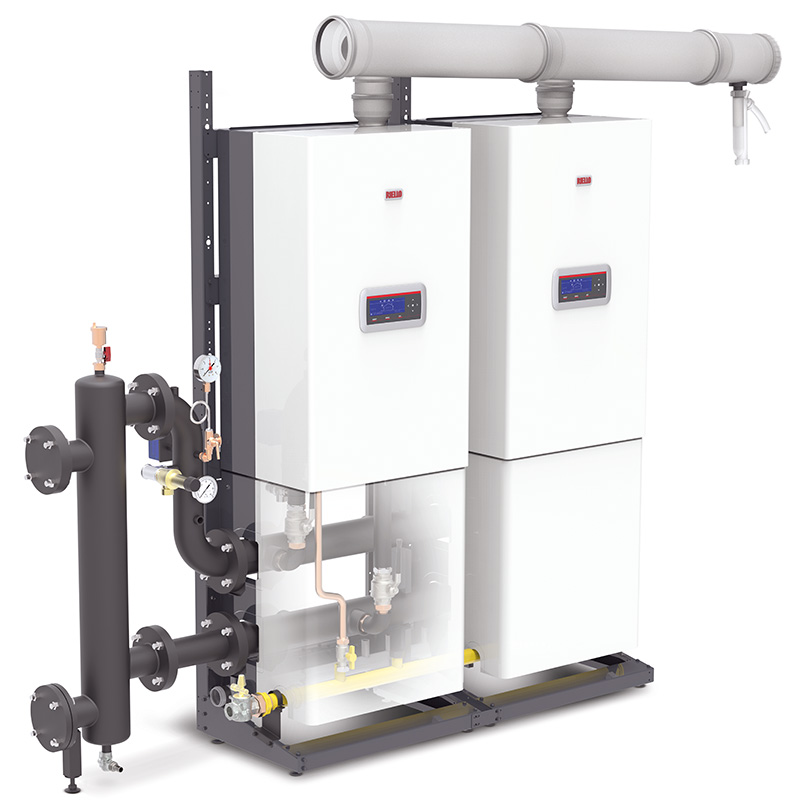
Mar 5, 2020 | News & Events
Flexibility is fast becoming a primary focus for many of today’s commercial condensing boiler installations. Martin Fletcher of Vokèra by Riello explores how commercial boiler manufacturers are addressing this need with advanced engineering solutions that combine heating innovation with a wide choice of accessories to create one product with almost limitless configurations.
Changing technology
As anyone involved in the heating industry knows, commercial boilers have changed significantly over the past few decades. These changes are due, primarily, to the introduction of gas condensing technology, which offers significantly greater efficiencies compared with non-condensing products. Typically, commercial boilers were big, floor standing units with a large footprint and in many cases they were sectional products that had to be assembled on site, involving considerable time and labour.
Needless to say modern commercial boilers have come a long way since those early models. Nowadays most appliances tend to be designed with heat engines and burners combined in a single box that can be wall-mounted (or floor mounted on a frame). This takes up a fraction of the footprint of the old sectional boiler and, thanks to condensing technology and associated innovations, modern boilers are able to offer much higher outputs for their size compared with the old non-condensing units.
Driving efficiency
But what has been the main driving force behind these changes? I believe the answer to that question is two-fold: the boiler manufacturers and legislation. Alongside a commitment to continuous product improvement and efficiency by leading boiler manufacturers like Riello Group, the heating industry has been the focus of increasingly stringent regulations to reduce carbon emissions. The urgent need to address climate change has been the motivation for many of the innovative technologies aimed at making our buildings more energy efficient. Given that commercial HVAC systems account for a high proportion of a building’s energy consumption it’s not surprising that boiler technology is among these innovations.
In recent decades the advancements in boiler design, together with regulations to increase energy efficiency in both the domestic and commercial heating markets, have driven the market towards smaller, more high-powered appliances. For example, a two-boiler cascade in our new Condexa Pro range offers around 250kW in a small footprint when compared with the larger footprint of older floor-standing units with a similar output. However, that’s not to say that there isn’t still a market for high-power, floor-standing appliances for certain applications and many manufacturers, including Riello Group, continue to produce them: the key difference is that now there is a choice.
Diverse needs
From a boiler manufacturer’s point of view it is important to be able to offer solutions that fit the myriad requirements of different commercial projects, both new build and refurbishment. At Vokèra by Riello we believe the concept of system flexibility, or what we describe as ‘one product, multiple configurations’ holds the key to meeting the diverse needs of this demanding sector. Indeed, we know from our extensive experience of working with commercial specifiers and installers that the challenges and permutations they encounter are virtually endless, from single standalone and multiple cascade configurations to all the different ventilation, zoning and control requirements.
An installation in, say, a school may call for external boilers in order to free up internal space for an extra classroom or storage facility. Also, although plant room size is not generally an issue, there are occasions where boiler dimensions are a critical factor because of restricted space or access, so the option of a smaller system that doesn’t compromise output is perfect. Different projects will also have different flue gas exhaust requirements – a factor which has been addressed in the development of our new Condexa Pro boilers. Whilst the range is configured for open-flue configurations optional ‘room-sealed’ kits are available that enable each appliance to be re-configured for room-sealed applications. A versatile flue solution, including standard, twin-pipe and concentric is one of the key aspects of system flexibility and not only expands siting possibilities but can be a huge factor when terminating flue gases safely whilst also taking in to consideration suitable ventilation.
Of course, offering this level of flexibility and such a wide range of accessories could be daunting for even the most experienced heating professional. That’s why we believe this approach must come with expert support, if required, from the manufacturer to help customers build different configurations and guide them through the choice of components to meet their particular project specification.
Modularity and control
Modularity is at the heart of the new flexible commercial boiler concept as it enables a number of output sizes to be combined to achieve the required output. Being modular also means greater ease of access to the boiler’s various component parts when it comes to servicing. With a truly modular system units can be combined in multi-cascade configurations and in linear or back-to-back cascade applications. In addition, today’s more sophisticated control technology can play a major part in monitoring and managing the operation of a cascade at optimum efficiency in relation to demand. In fact, having this high level of integrated control means that in some cases an expensive Building Management System may not even be necessary. In addition to these benefits, the latest integrated logic-control (as used in our new Condexa Pro boiler range) enables a ‘managing’ and ‘dependant’ operation, allowing for the interchangeability of modules and for individual units to be isolated for routine servicing without disrupting continuity of operation.
Future flexibility
Looking to the future, we believe flexibility will remain an important consideration in commercial boiler specification, alongside enhanced efficiency and lower emissions in the continuing quest for cleaner, greener heating. Whilst condensing technology already offers high efficiencies and ultra-low NOx emissions, further advancements in technology will enable the next generation of boilers to become even more efficient. We have already seen tighter emissions control with the recent introduction of NOx Class 6, where Class 5 had previously been the standard. This reflects the ongoing drive to improve air quality and achieve climate change targets. As a leading manufacturer of heating solutions, we will continue to only develop and market products that comply with the latest legislation and as the regulatory goalposts move, as no doubt they will, we shall have the foresight and flexibility to change with them.
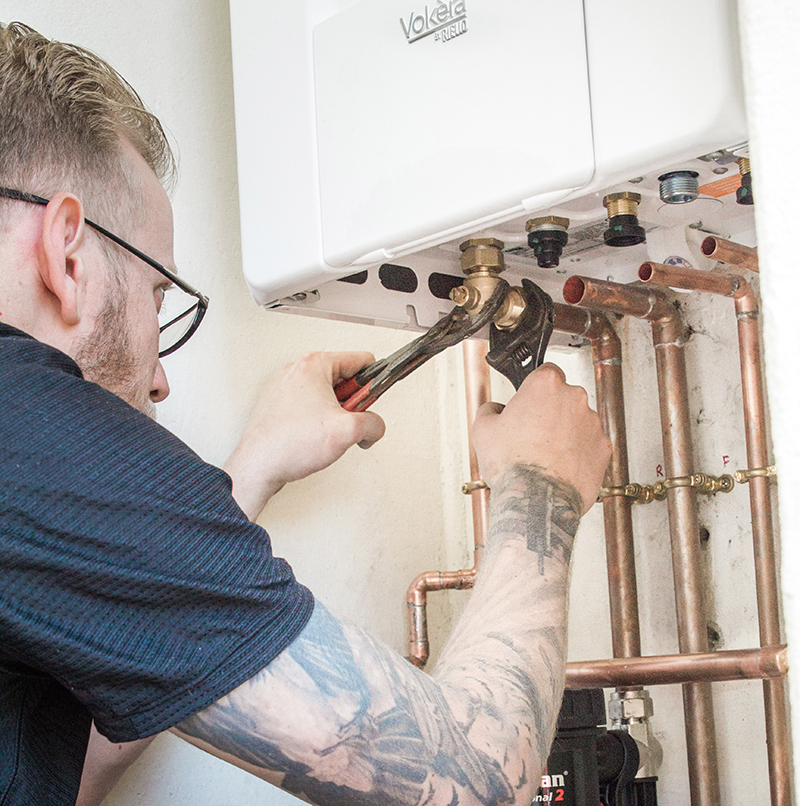
Feb 11, 2020 | News & Events
Although the majority of flueing systems for modern domestic condensing boilers can be relatively straightforward, there will always be some installations that require greater flexibility in siting and sizing. Eric Brawley, Technical Co-Ordinator at Vokèra by Riello tackles the topic of non-standard flueing.
Planning and positioning
A correctly specified and fitted flue is an essential element of a safe and efficient condensing boiler installation. The planning and positioning of the flue is key to keeping people safe from potentially harmful gases and Boiler Flue Regulations are in place to ensure installations meet strict health and safety standards. While most of the flueing requirements that Gas Safe Registered installers encounter on a day-to-day basis will be pretty standard, we believe it is important to be ready and able to deal with more unusual situations should they arise. It is for this reason that we run comprehensive courses covering all aspects of Vokèra boiler installation and commissioning, including flueing, and offer an extensive range of flue variants for all our domestic boilers. Indeed, some of the longest runs possible in the industry are permissible with our flue accessories in both horizontal and vertical options.
Managing pluming
There are, of course, some key considerations when siting any flue for a condensing boiler. Mitigating the possible nuisance of pluming is just one of these considerations. BS5440-1, which covers the flueing and ventilation of gas appliances, specifies the minimum clearances for flue terminal locations to prevent a plume of condensate causing an issue for neighbouring properties or public spaces. As well as the nuisance factor, plumes of water vapour may also cause damp patches on surfaces near the flue terminal. In addition to compliant siting of the flue, installers could also consider using a plume diversion kit, or designing a longer flue to help manage pluming.
Length matters
A non-standard flue will often relate to the length. For example, a longer run may be required when relocating an existing boiler, or where a standard flue isn’t practical for the preferred siting of a new boiler. Installers should always check the maximum overall length against the boiler model they are planning to use as they do vary. For most domestic condensing boilers a standard flue is a 100/60mm concentric. Flue extension lengths are generally available for this type of flue but usually up to a maximum of around 2 metres. Larger concentric flue systems of 125/80mm are also offered by most manufacturers and some may be extended but, again, only up to a maximum of about 2 metres.
For installations that require greater lengths a twin parallel flue system may be available. On some Vokèra models this type of flue can be up to 50 metres on each of the air duct and flue duct, which should cover most requirements. When using our twin pipe systems installers are advised to terminate them with a collector box and a single horizontal or vertical 125mm OD terminal or a two port terminal gate.
Adequate support
Whatever type of flue system is selected it must be adequately supported throughout its length. For flues concealed within a void access must be provided (300 x 300mm) within 700mm of every joint (although this is not necessary with a flexible flue in a constructional chimney). Details of requirements relating to flues in voids were published in a 2019 Gas Safe Register Technical Bulletin and refer to properties, most likely flats or apartments, which have a room sealed, fan assisted boiler with a flue which is concealed behind a ceiling or wall. As the flue removes potentially harmful fumes from the boiler it needs to be accessible for inspection by a Gas Safe Registered engineer, either as part of the annual safety check or in the event of a problem with the heating system.
Rear flueing
For some situations, a rear flue option can offer a versatile alternative to a standard top flue. Where space is at a premium, for example, running the flue directly from the rear of the boiler will keep the overall installation footprint to a minimum. This type of flue can also increase siting flexibility for practical and aesthetic purposes. The direct rear flue option for Vokèra boilers is telescopic and can be cut to 320mm minimum and is adjustable between 600mm and 825mm maximum for optimum versatility.
Verification requests
Following the 2019 Gas Safe Register Bulletin regarding verification that an unusual flue installation complies with the manufacturer’s instructions, Vokèra’s Technical Team has been receiving regular confirmation requests on installations. In order to provide verification we simply ask the attending engineer to supply some photographs of the installation, together with the project address and dimensions. If it has been installed correctly, we will keep a record of the communication from the engineer so no one is in doubt that it is compliant.
Be safe, not sorry
Correct flueing is a critical aspect of a condensing boiler installation with health and safety implications that shouldn’t be underestimated. As such, flueing should be given careful consideration on every installation, regardless of whether it’s a standard system or a more complex design. That’s why at Vokèra we advise installers to always check the boiler manufacturer’s instructions and to seek expert advice if they are in any doubt, because it is better to be safe than sorry.
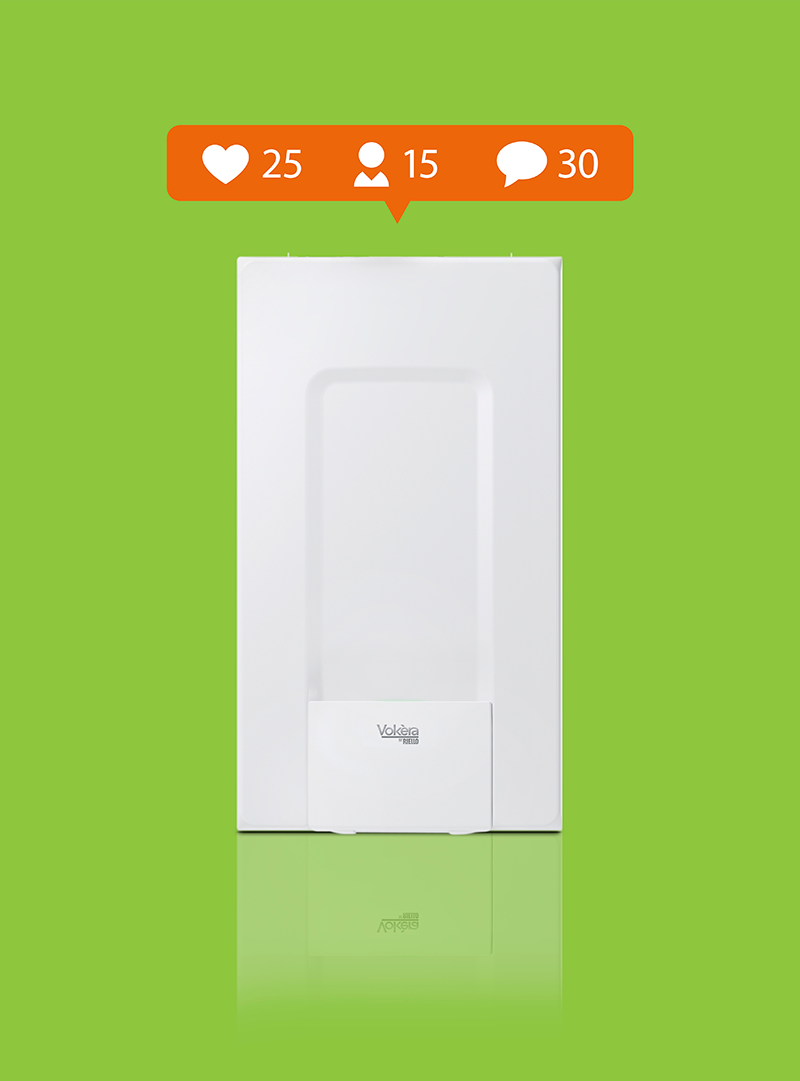
Feb 10, 2020 | News & Events
Love it or hate it, social media is now an integral part of everyday life for many people. Neil Mattock, Marketing Director at Vokèra by Riello, looks at how social networking can also be good for business.
Streamlining communication
Although it may have started out as a communication tool for sharing photos, opinions and events, social media today is used for much more than just social interaction. The popular networking sites, such as Facebook and Twitter, can also be powerful business tools that make it faster and easier than ever before to communicate with customers, suppliers and manufacturers. Companies can talk directly to existing and potential clients via these online platforms and respond more quickly to enquiries, helping to improve their customer service levels. Indeed, social media interaction with heating installers is now part of the daily routine for Vokèra’s Technical Support Team. Industry forums provide an ideal way for us to communicate with installers and we are often able to answer their queries without them having to even pick up a phone. That’s not to say that actually meeting and talking to your customers is no longer important because it is. However, using social media to get an ‘instant’ answer to a question can often be a real boon for a busy installer.
Be selective
From our experience at Vokèra it pays to be selective when using this technology for business, whether you are an installer looking to set up your own business page or profile on social media, or simply following your preferred suppliers. By following the companies you deal with on a regular basis you’ll get instant access to news about their latest promotions, product developments, and any professional training or trade events you may be interested in attending. As well as news updates, these sites are a great place to hear what people are saying and to join in conversations about issues that affect our industry. Vokèra is active on Twitter, Facebook and LinkedIn and we find the interaction with our followers is invaluable in understanding what is important to them. They can communicate their feedback to us in ‘real time’ and send messages directly to key members of our team. Our social media accounts also offer easy access to associated groups including Vokèra BeSMART controls.
Industry forums
Industry forums are another popular form of social networking for the heating industry. These sites may be open to the public or restricted to members-only and have strict rules to encourage positive and respectful online behaviour. The ‘Gas Chat’ group on Facebook, for example, has over 12,000 members and gas heating engineers can chat online with their peers about issues that affect their working lives. They provide a virtual meeting place to share experiences and advice, which many find very useful. In addition, installers can use social media to stay on top of industry news, such as regulatory changes, by following relevant industry bodies and organisations, and then sharing this information with their own followers.
Customer engagement
Many installers also have their own social media accounts to promote their business and generate leads. As already mentioned, social media is all about communication and engagement, so it is important to get the right mix of business and personal messages to connect and build quality relationships with your target audience. Also, it is worth noting that the most commonly-shared content on social media is an image. By including a picture with your posts, possibly a recently completed installation, you can share your successes and significantly increase your chances of getting a follower to share the post with their network, and so on. In fact, there are a few well-known installers who have built a huge number of followers through their strong social media presence and become influencers in our industry.
Although social media sometimes gets a bad press it has clearly helped streamline communication and networking in business and so could be described as the new ‘word of mouth’. If it is used effectively, politely and for genuine communication, social media can be a really valuable platform for a new or existing business, helping to generate new leads, boost brand awareness, share knowledge and build quality relationships with customers.
Follow Vokèra on: Facebook | Twitter | LinkedIn
 By Neil Saunders, sales & marketing director at Vokèra by Riello, Global Comfort Solutions Europe, Carrier.
By Neil Saunders, sales & marketing director at Vokèra by Riello, Global Comfort Solutions Europe, Carrier.






 About Riello
About Riello 




